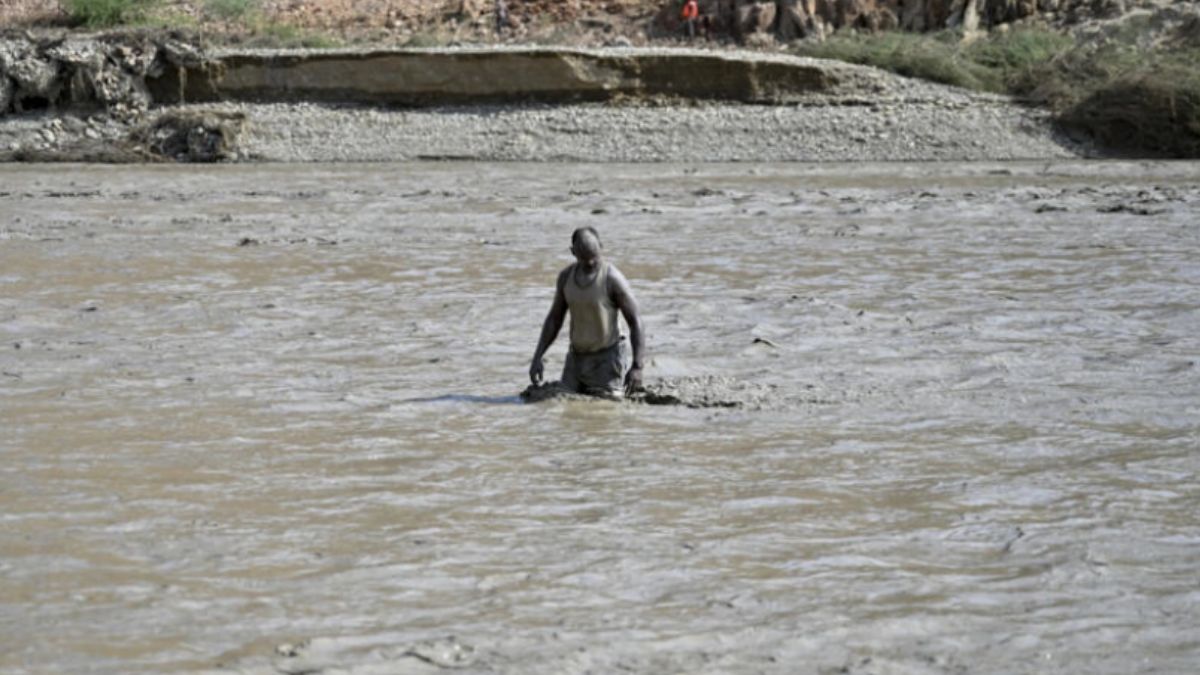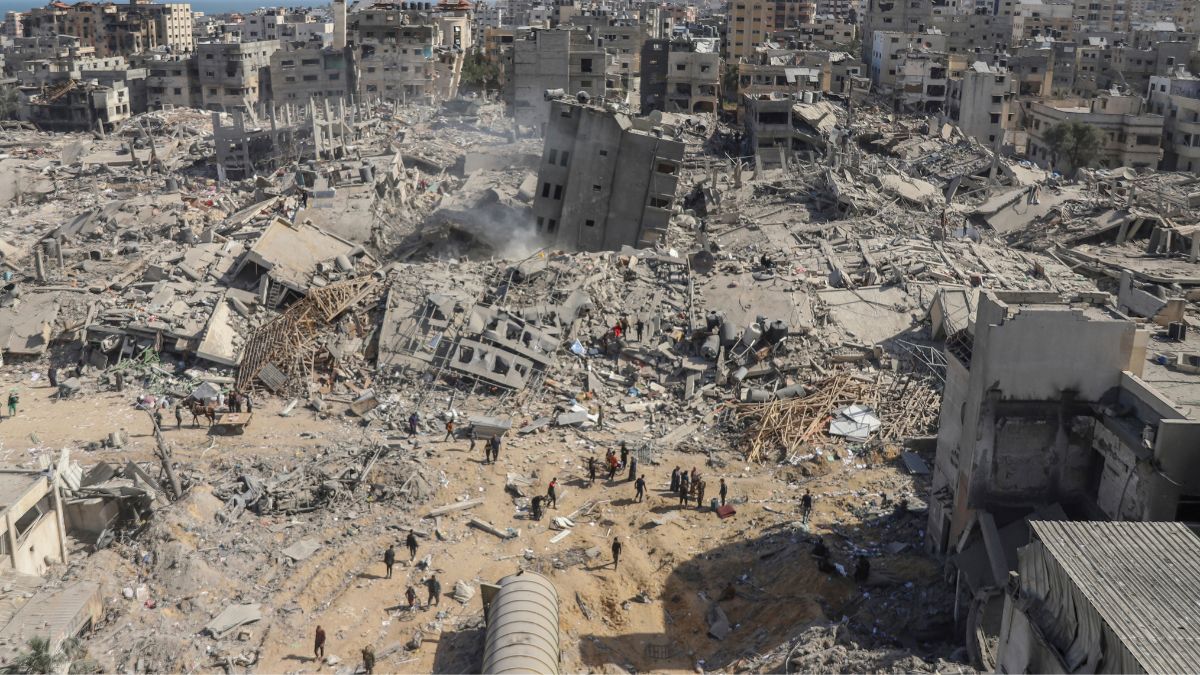Ukraine’s forces have launched a surprise incursion into Russia’s Kursk, capturing more than 1,000 square kilometres and 74 towns and settlements. The mastermind behind this is Ukraine’s top military commander Oleksandr Syrski, the 58-year-old who has vast experience on the battlefield, earning him the nickname, ‘the butcher’ read more
)
Commander-in-Chief of the Armed Forces of Ukraine Oleksandr Syrskyi has attained popularity amidst Kyiv's successful incursion into Russia's Kursk region. Syrskyi is the brains behind the attack. File image/AFP
The Russia-Ukraine war, which is inching slowly towards the 950 day mark, has seen many twists and turns. And in the latest twist, Ukraine has been pushing forward into Russian territory, with President Volodymyr Zelenskyy saying troops hold 74 towns and settlements in the area, encompassing about 1,000 square kilometres (400 square miles) of territory.
It all began on August 6 when Ukrainian troops in tanks and other armoured vehicles began coming from several directions into Russia’s Kursk region and were met with little resistance at the Russian border. This is now Ukraine’s deepest incursion into Russia since Moscow launched its full-scale invasion in 2022.
But how has Ukraine been able to achieve such success in Russia’s Kursk? Who is responsible for the Ukrainian incursion, which according to analysts has left Russian President Vladimir Putin red-faced?
We have the answers for you.
Who’s responsible for Ukraine’s incursion into Russia?
The answer to this is simple: Ukraine’s top military commander Oleksandr Syrsky, who was appointed only in February to the position, replacing Valerii Zaluzhnyi, now Ukraine’s ambassador to the United Kingdom.
But who exactly is Oleksandr Syrski?
Syrskyi was born in July 1965 in Russia’s Vladimir region, which was then part of the Soviet Union. He has lived in Ukraine since the 1980s. Like many people of his age in Ukraine’s armed forces, he studied in Moscow — at the Higher Military Command School — among peers who have since become Russian commanders, graduating in 1986 and serving for five years in the Soviet Artillery Corps.
Even though he has been living in Ukraine since the ’80s, his command, as per an AFP report, is far from perfect. Moreover, he continues to have ties with Russia — his parents and brother still live there. But he’s hardly in touch with them; his brother earlier told Russia’s state media, TASS: “I’m not in touch with him, I don’t even know where he is. I don’t know anything about him.”
The Guardian has reported that his mother Lyudmila had “liked” social media publications supporting the invasion of Ukraine.
In 2019, he became the head of Ukraine’s land forces. Earlier, he had commanded Ukrainian troops fighting a Moscow-backed insurgency in the eastern Donetsk and Luhansk regions that began in 2014, and was given the call sign “Snow leopard”.
Syrskyi shot to fame in 2022 as he led the defence of Kyiv in the early days of the Russian invasion. For the bravery that he displayed then, President Zelenskyy named him Hero of Ukraine — the country’s highest honour.
In July 2022, he once again was the mastermind behind the counteroffensive that pushed Russian troops away from the city of Kharkiv and retook swathes of land to the east and southeast.
He’s also the one who led Ukraine’s defence of the eastern city of Bakhmut, where thousands of soldiers on both sides were killed in one of the bloodiest battles of the war so far. Despite criticism of the number of soldiers he lost in that battle, Syrskyi maintains that it damaged Russia’s overall war effort by tying down the Wagner mercenary group. The battle of Bakhmut also earned Syrskyi the title of “Butcher” because he was considered to have little regard for the loss of human life.
A highly-placed Ukrainian official told AFP that Syrskyi takes “great offence over this nickname”, arguing that he takes great care to minimise losses among his troops.
It was in February this year, that President Zelenskyy promoted Syrskyi to commander of the armed forces. With this promotion, Syrskyi replaced the country’s famous commander-in-chief, Valerii Zaluzhnyi — a move many called unprecedented.
Now 58, Syrskyi has been accused by many of Soviet military thinking. However, his supporters call him a disciplined commander, who is often on the frontline. As The Guardian noted in one of its reports, “Close up, Syrskyi is warm and personable. His handshake is suitably iron.”
When asked what he does while he’s not engaged in war, he told the British outlet that he reads books on Ukrainian history, in order to understand past “processes”. “We have brave people and a difficult history,” he told The Guardian.
Also read: Ukraine’s incursion into Russia: Why are Ukrainian vehicles marked with white triangles?
How far has Ukraine’s incursion been?
Under the watchful eye of Syrskyi, Ukraine began an incursion into Russian territory in Kursk on August 6. Since then, Ukrainian forces have been pushing deeper into the region, with President Zelenskyy saying on Wednesday (August 14), “Today we have advanced well in the Kursk region. We are achieving our strategic goal.”
Ukraine also claimed on Wednesday to have shot down a Russian Su-34 jet overnight in the Kursk region, where it said it had also captured 100 Russian prisoners.
Zelenskyy added that all in Ukraine should now “act unitedly and efficiently as we did in the first weeks and months of this war when Ukraine took the initiative and began to turn the situation to the benefit of our state.
“Now we have done the exact same thing — we have proven once again that we, Ukrainians, are capable of achieving our goals in any situation — capable of defending our interests and our independence.”
But what will Ukraine do of the land it has seized so far? Kyiv has said that it would not hold on to Russian land it captured and offered to stop raids if Moscow agreed to a “just peace”. “The sooner Russia agrees to restore a just peace… the sooner the raids by the Ukrainian defence forces into Russia will stop,” foreign ministry spokesman Georgiy Tykhy was quoted as saying by AFP.
In the meantime, more than 120,000 Russians have fled their homes in Kursk’s border areas, with the region’s governor announcing late Wednesday that another district had been evacuated.
How has Russia responded to the incursion?
A week into the incursion, Russia has responded to Ukraine’s incursion with anger. Last Sunday, Russian foreign ministry said Moscow’s forces will deliver a “tough response” to Ukraine’s surprise incursion into Russia’s territory.
A day later, Russian President Vladimir Putin said that Ukraine was trying to undermine Russian stability and warned that Ukraine would receive “a worthy response”.
The New York Times quoted the Russian strongman as saying: “The West is fighting us with the hands of the Ukrainians. The enemy will certainly get the response he deserves, and all our goals, without doubt, will be accomplished.”
Russia has redeployed some troops to Kursk from the strategically significant region near Ukraine’s second-largest city, Kharkiv. Russia is unlikely to pull entire fighting units from eastern Ukraine but could redirect troops that were meant to reinforce the front lines in Donetsk, according to The Institute for the Study of War analytic group.
But the implications of this incursion go far beyond the frontline. As the BBC notes, what’s happened in Kursk is a symbolic rather than a decisive blow for President Putin.
A Ukrainian source speaking to The Independent said: “Putin is humiliated; we’ve embarrassed Russia once again. We have shown to the Russian people that their tsar cannot protect them.”
With inputs from agencies

 2 months ago
23
2 months ago
23
)
)
)
)
)
)
)
)
)
)
)
)
)
)
)
)
)
)
)
)
)
)
)
)
)
 English (US) ·
English (US) ·